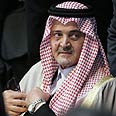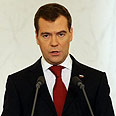

Saudi Arabia said it prefers an "immediate resolution" to the crisis over Iran's nuclear program rather than sanctions, as US Secretary of State Hillary Clinton prepared to wrap up a Gulf tour on Tuesday.
A Saudi official suggested a settlement freeze in Israel as an alternative to military action.
US officials travelling with Clinton on the mission to drum up support for tougher action against Iran expressed satisfaction and said they were "very pleased" following her lengthy talks with King Abdullah on Monday.
But Saudi Foreign Minister Prince Saud al-Faisal sounded less supportive of further sanctions against the Islamic republic, qualifying such measures as a "long-term solution."
"We see the issue in the shorter term because we are closer to the threat ... We need an immediate resolution," Saud said in a midnight press conference after meetings with his US counterpart.
It was not immediately clear whether Saud, who spoke in English, was calling for a tough and immediate UN Security Council resolution or another solution to the perceived threat from Iran.
A Saudi foreign policy official on Tuesday stressed Riyadh was not advocating military action but rather a linkage with the Middle East peace process as a faster and more effective means to ease tensions in the region.
"There is no point in our spending all our time on sanctions which will not have an effect in the short term. We need something more tangible," he said, asking not to be identified.
"We don't want a military strike ... A military strike, we still believe, will be very counter-productive," he said.
"We need to do something on Israel and the Palestinians ... For instance, the US could get Israel to halt (Jewish) settlements" on the occupied West Bank, the official said.
"There is a credibility issue with the US administration on promises it cannot fulfill," he said, referring to the stalled peace process.
Clinton's tour of Qatar and Saudi Arabia aimed to isolate Iran from its Arab neighbours in the Gulf and to put pressure on China to drop its resistance to UN sanctions targeting mainly Iran's Revolutionary Guards.
Russia does not exclude sanctions
Meanwhile the Kremlin said Iran could face sanctions if the Islamic Republic fails to allay international fears about its nuclear program.
President Dmitry Medvedev's spokeswoman said Russia wanted Iran to cooperate more closely with the United Nations nuclear body, the International Atomic Energy Agency (IAEA).
"Russia considers that Iran must work more actively and more broadly with the IAEA and with other countries in providing information about its nuclear programme," Kremlin spokeswoman Natalya Timakova told reporters.
"The international community must be sure that Iran's nuclear program is peaceful. But if these obligations are not fulfilled then nobody can rule out the use of sanctions," she said at Medvedev's residence outside Moscow.
Timakova said Medvedev outlined Moscow's position on Iran to Prime Minister Benjamin Netanyahu at a Kremlin meeting on Monday.















